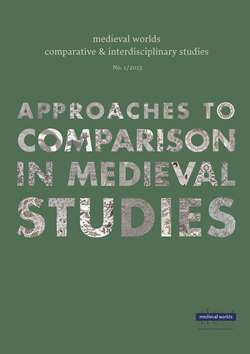Lars Boje Mortensen
S. 25 - 39
doi:
10.1553/medievalworlds_no1_2015s25
Verlag der Österreichischen Akademie der Wissenschaften
Abstract:
This contribution proposes to compare, but also to connect, the rise of a new type of unlearned historical report, ›fast historiography‹, in Latin and vernacular in the twelfth and thirteenth centuries. Connections are suggested by combining the characteristics of such writing with book and library history as well with social history. New roles of book writing coincided with a larger social spread among authors as well as with a new library horizon – books now began to circulate at higher speed, in greater numbers and in less solemn circumstances. These possibilities were exploited and pushed forward both in Latin and vernacular historiography. This connection has been overlooked for several reasons, primarily because Latin and vernacular literatures are often considered each on their own terms, compartmentalized into two ›traditions‹ in which Latin seems to bear an automatic tag as learned and ecclesiastical. But this is not the case with Gesta Francorum, Galbert of Bruges, Raol (on the conquest of Lisbon), Caffaro, Henry of Livonia etc. – they all resemble the simple account in French of Robert de Clari and others. Related to this argument, the article opens with reflections on canons and paradigms of European medieval historiography (in papal Europe) and suggests that comparisons and connections always spring from certain strong national canons and that the questions they are devised to answer are to a large degree determined by such canonical series. Indirectly the article is therefore also an experiment with comparisons outside the dominant national canons and between non-canonical pieces.
medieval historiography, literature, library, book production, Latin, vernacular, thirteenth century, Europe, canon
Published Online:
2015/06/30 10:22:50
Object Identifier:
0xc1aa5576 0x00324b5d
Rights:All rights reserved.For questions regarding copyright and copies please contact us by email.
MEDIEVAL WORLDS provides a new forum for interdisciplinary and transcultural studies of the Middle Ages. Specifically it encourages and links comparative research between different regions and fields and promotes methodological innovation in transdisciplinary studies. Focusing on the Middle Ages (c. 400-1500 CE, but can be extended whenever thematically fruitful or appropriate), MEDIEVAL WORLDS takes a global approach to studying history in a comparative setting.
MEDIEVAL WORLDS is open to regular submissions on comparative topics, but also offers the possibility to propose or advertise subjects that lend themselves to comparison. With a view to connecting people working on related topics in different academic environments, we publish calls for matching articles and for contributions on particular issues.
TABLE OF CONTENTS
Walter POHL and Andre GINGRICH
Medieval Worlds: Introduction to the First Issue
Patrick GEARY, The Discourse of Herrschaft as the Practice of Herrschaft in the Fifth Century
Robert MOORE, The First Great Divergence?
Lars Boje MORTENSEN, Comparing and Connecting: the Rise of Fast Historiography in Latin and Vernacular (Twelfth to Thirteenth Century)
Helen SIU, Historical Anthropology: A View from »South China«
COMPARATIVE PAPERS: UNIVERSAL HISTORIES
Ian WOOD, Universal Chronicles in the Early Medieval West
Ann CHRISTYS, Universal Chronicles in Arabic before c. 900
COMPARATIVE HISTORY IN THE MAKING: ONGOING MAJOR RESEARCH PROJECTS
Gwen BENNETT, »I Spy with my Little Eye«: GIS and Archaeological Perspectives on Eleventh Century Song Envoy Routes in the Liao Empire (Kitan-Liao Archaeological Survey and History KLASH)
Michael BORGOLTE, Foundations »For the Salvation of the Soul« – an Exception in World History? (Foundations of Medieval Societies FOUNDMED)
Catherine HOLMES and Naomi STANDEN, Defining the Global Middle Ages (AHRC Research Network)
Eduardo MANZANO, Why Did Islamic Medieval Institutions Become So Different from Western Medieval Institutions? (Power and Institutions in Medieval Islam and Christendom PIMIC)
Walter POHL and Andre GINGRICH, Visions of Community (VISCOM): Comparative Approaches to Ethnicity, Region and Empire in Christianity, Islam and Buddhism (400-1600 CE)
John TOLAN, The Legal Status of Religious Minorities in the Euro-Mediterranean World (RELMIN)
The journal is funded by the Austrian Science Fund (FWF).






 Home
Home Print
Print
 References
References
 Share
Share
